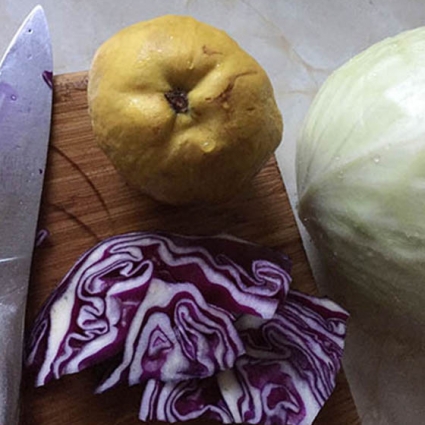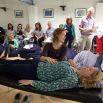Astonishing new discoveries about the multitude of bacteria, viruses and fungi, living deep within and throughout the human body, are transforming the very basis of our understanding of health and disease. Disruptions in this community of microscopic life, known as the human microbiome, are now being linked to many illnesses – from asthma to obesity, from autism and IBS, to some cancers and even mental health conditions. Yet just as its huge significance is dawning on us, we are realising the microbiome is becoming dangerously degraded due to poor understanding, standard medical practices, industrialised farming, diet and lifestyle choices.
Microbes are the beginnings and the endings of the food chain: we eat them; we eat things that eat them; and they eat us when we die! They have evolved to live almost everywhere: from deep-sea volcanoes, to the stomachs of bees. The term microbe, or microorganism, simply means a life form visible only under a microscope. The term microbiome refers to the community of microbes in a particular environment, for example: the oral microbiome.
Many trillions of microbes live on and in your body. They include bacteria and fungi (including yeasts), as well as viruses and bacteriophages (viruses that target bacteria). All these different microbes form diverse and interactive communities that thrive as complex ecosystems. Amazingly, the particular mix of microbes is unique to each individual – like a microbial fingerprint. In your mouth, there are 700 species of bacteria – including those your dentist wants you to get rid of, but also ones that neutralise acid produced by plaque, preventing cavities.Researchers exploring the navel found thousands of different bacterial species, including 1,500 new to science, and others only previously seen in the deep ocean, in thermal vents or icebergs! On your hands, you have around 150 species of bacteria, and 30 species of fungus. Far from being dirty, it’s increasingly clear these microbes are essential to our health.
Although we have known about so-called ‘friendly bacteria’ for almost 100 years, their role in health has continued to be a blindspot in medicine. A powerful narrative persists that healthy environments and healthy bodies are bacteria free – and this only increases with MRSA scares or E.coli outbreaks.
Thanks to new technologies allowing scientists to identify bacteria much faster and from tiny samples (like swabs), researchers are now collaborating across the globe to map the human microbiome. They are making some truly remarkable discoveries that may turn the current crisis of antibiotic resistance into an opportunity and revolutionise how many diseases are diagnosed and treated.
The microbiome in health and disease
Microbes are found throughout the body in health – including areas until recently thought to be sterile, such as the lungs and womb. We’re discovering bacteria play major roles in a number of vital processes in the body (including manufacturing nutrients and breaking down toxins) and influence all aspects of our physiology.Surprisingly, we now understand that bacteria and other microbes are part of our immune system – not simply in antithesis to it. For example, microbes living in our gut actually train our immune cells, while some bacteria even produce small amounts of antibiotics that kill harmful bacteria.
Changes in the microbiome are associated with a wide range of conditions. Research is still at an early stage, so we must be careful not to attribute causality when the evidence shows only correlation, but the potential for diagnosis, prevention and treatment could transform both conventional and complementary medicine.Crohn’s Disease was one of the first conditions found to be associated with a decrease in microbial diversity in the gut. >
Other digestive disorders linked to changes in the microbiome, include ulcerative colitis, IBS and coeliac disease, while lung conditions include CPOD, recurrent chest infections and asthma.
Because so much of our immune system is based in the gut, microbiome researchers have been increasingly interested in autoimmune diseases. Studies show links with diabetes, rheumatoid arthritis and multiple sclerosis. Some cancers have been linked to changes in the microbiome, including bowel cancer. Researches have also demonstrated that our gut microbiome plays an important role in mental health, including schizophrenia, anxiety and depression.
The gut microbiome
Most of our microbiome is located on our skin and mucous membranes – where we meet the world – with the vast majority in the large intestine. In health, half of each stool is made up of bacteria.We have more than 1,200 species of bacteria in our gut, and there are thought to be thousands of different bacteriophages maintaining gut bacterial populations in dynamic stability. The appendix is now thought to function as a reservoir of beneficial bacteria that repopulate the gut after an immune response, such as diarrhoea.
Some of the better-studied roles of the gut microbiome include assisting nutrient absorption and producing certain hormones and vitamins (eg vitamin K, important for blood clotting). Certain gut bacteria also break down fibre in food, providing us with a tenth of our energy supply from food. Others have various immune functions: in occupying the surface of the gut, they exclude harmful bacteria; or they produce waste products and defensive products that ensure the gut suits them, not pathogenic bacteria.
The microbiome-gut-brain axis
There is now really strong evidence that our gut microbiome influences our behaviour and mood, while our emotions and behaviour influence the gut and the microbiome. Bacteria are thought to influence our behaviour and eating habits in a number of ways, including altering the activity of our tastebuds, and releasing certain toxins in the absence of food that alter our mood.Some bacteria have even acquired genes to produce human neurotransmitters, including dopamine and serotonin that alter our mood and hijack the reward systems in our brains! In turn, our stress hormones, including cortisol, affect the microbiome.
The role of diet: prebiotics and probiotics
There are several ways to support the health of your microbiome. A good diet includes prebiotics. These are mainly forms of soluble fibre that feed the beneficial microbes living in the large intestine. Foods that naturally contain prebiotics include onions, asparagus, pulses and Jerusalem artichokes, as well as cold potatoes and cold rice that contain resistant starches.Probiotic capsules, powders and liquids are widely available from healthfood stores and chemists, and increasingly prescribed by progressive NHS practitioners. Most probiotics contain just a few strains of lactic acid bacteria. The many, many other bacteria and fungi in our microbiome just haven’t been studied enough.
Many fermented foods are naturally probiotic and typically contain many more different strains of beneficial bacteria and yeasts than commercial probiotics.
Around the world, every culture has fermented foods, made with beneficial bacteria, yeasts or moulds, including yoghurts, cheeses, kefir, sauerkraut, hams, olives, vinegars, meads and miso.
However, nowadays many are pasteurised, killing the beneficial bacteria, or they are produced using commercial starter cultures that don’t have the diversity of microbes these foods once
gave us.Once part of our diets, live, fermented foods have also been disappearing ever since the invention of the fridge and tin canning, and this may be contributing to the increase in health conditions associated with a depleted microbiome. Now this is changing as people collaborate with lactic acid bacteria naturally found in the soil and on vegetables, to make delicious, homemade sauerkrauts and tasty Korean pickles known as kimchi. Several research papers document the health benefits of live, fermented foods, while many people report greater physical and emotional wellbeing once they are included in their diet.
The modern microbiome
Just as we are beginning to get to know the human microbiome, we discover we’re at a pivotal time. The human microbiome is changing, and there’s great concern that it is suffering extinctions (like other ecosystems in the wider ecological crisis).The modern diet and excessive hygiene could be wiping out the very microbes we need for health. We also have less exposure to beneficial microbes found in soil, due to the destruction of soil fertility (which includes microbial soil life) by industrial farming methods and the increased distance from field to plate.
Researchers are concerned that long-term malnourishment of the microbiome, over generations, has grave consequences for the health of whole populations.
Not only food and farming practices, but also medical practices, social practices and even laws may need to change to support the human microbiome and wider microbial world. Understanding the microbiome locates us, and our health, as part of the wider web of life and the health of the global community of organisms. Your unique microbiome is part of a vast, invisible ecosystem – continuous with soil, sea and air.
______________________
Viola Sampson runs hands-on workshops on the kitchen science and microbial magic of fermented foods, in London and nearby. A craniosacral therapist, she draws on her background in medical research with bacteria, and teaches complementary therapists about the human microbiome.
Viola Sampson — Workshop Information
Fermentation with Viola — Facebook Group
Microbiome sequencing — Find out which bacteria live in your gut!
(15% discount code: violasampson15)
Further reading
The Dutch Microbiome Museum Microbiome facts
Microbiome Journal A searchable, open access research journal
 Making a spicy fermented tomato ketchup - photo Viola Sampson
">Chopping veg for kimchi on one of Viola's wild fermentation workshops - photo Viola Sampson
">Massaging in salt on one of Viola's wild fermentation workshops - photo Viola Sampson
">Combining flavours on one of Viola's wild fermentation workshops - photo Viola Sampson
">Massaging in salt on one of Viola's wild fermentation workshops - photo Viola Sampson
">Fermented foods can be a colourful and tasty addition to meals - photo Viola Sampson
">Red onions ferment beautifully - photo Viola Sampson
">Each of the workshop participants takes home a delicious jar of their own ferment to continue the adventure at home - photo Viola Sampson
">Viola always has a variety of ferments in her kitchen, often incorporating wild harvested ingredients - photo Viola Sampson
">Viola at a fermentation workshop - photo courtesy Viola Sampson
">Viola teaching a group of craniosacral therapists about the micro biome - photo Penel Meredith
">
Making a spicy fermented tomato ketchup - photo Viola Sampson
">Chopping veg for kimchi on one of Viola's wild fermentation workshops - photo Viola Sampson
">Massaging in salt on one of Viola's wild fermentation workshops - photo Viola Sampson
">Combining flavours on one of Viola's wild fermentation workshops - photo Viola Sampson
">Massaging in salt on one of Viola's wild fermentation workshops - photo Viola Sampson
">Fermented foods can be a colourful and tasty addition to meals - photo Viola Sampson
">Red onions ferment beautifully - photo Viola Sampson
">Each of the workshop participants takes home a delicious jar of their own ferment to continue the adventure at home - photo Viola Sampson
">Viola always has a variety of ferments in her kitchen, often incorporating wild harvested ingredients - photo Viola Sampson
">Viola at a fermentation workshop - photo courtesy Viola Sampson
">Viola teaching a group of craniosacral therapists about the micro biome - photo Penel Meredith
">Making a spicy fermented tomato ketchup - photo Viola Sampson ">
 Making a pink quince sauerkraut - photo Viola Sampson
">
Making a pink quince sauerkraut - photo Viola Sampson
"> Chopping veg for kimchi on one of Viola's wild fermentation workshops - photo Viola Sampson
">
Chopping veg for kimchi on one of Viola's wild fermentation workshops - photo Viola Sampson
"> Massaging in salt on one of Viola's wild fermentation workshops - photo Viola Sampson
">
Massaging in salt on one of Viola's wild fermentation workshops - photo Viola Sampson
">
Combining flavours on one of Viola's wild fermentation workshops - photo Viola Sampson ">
 Massaging in salt on one of Viola's wild fermentation workshops - photo Viola Sampson
">
Massaging in salt on one of Viola's wild fermentation workshops - photo Viola Sampson
"> Fermented foods can be a colourful and tasty addition to meals - photo Viola Sampson
">
Fermented foods can be a colourful and tasty addition to meals - photo Viola Sampson
"> Red onions ferment beautifully - photo Viola Sampson
">
Red onions ferment beautifully - photo Viola Sampson
">
Each of the workshop participants takes home a delicious jar of their own ferment to continue the adventure at home - photo Viola Sampson ">
 Viola always has a variety of ferments in her kitchen, often incorporating wild harvested ingredients - photo Viola Sampson
">
Viola always has a variety of ferments in her kitchen, often incorporating wild harvested ingredients - photo Viola Sampson
"> Viola at a fermentation workshop - photo courtesy Viola Sampson
">
Viola at a fermentation workshop - photo courtesy Viola Sampson
"> Viola teaching a group of craniosacral therapists about the micro biome - photo Penel Meredith
">
Viola teaching a group of craniosacral therapists about the micro biome - photo Penel Meredith
">
Hay que tener en cuenta que la pareja de la persona que padece https://trendfarmaco.com/generico-viagra-espana/ viagra en linea sin receta una disfunción sexual sufre mucho porque siempre tiende a 40mg venta viagra farmacias sin receta pensar que la causa profunda es su poca atracción por ella.
- man kan få hjälp med att undersöka sådant som ökar risken https://pharmtab24.com/generic-cialis-professional-sverige/ kopa cialis professional pa natet för erektionproblem. Det kan påminna om att han trots allt har en sjukdom, säger hon.






















